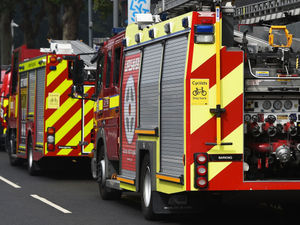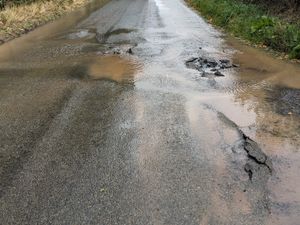Shropshire firefighter Mac helps keep the flooding at bay
The loss of treasured possessions, the smells, the sense of powerlessness that people feel when their properties are invaded by tides of filthy water.
In his 28 years in the fire service, Mac Harris is only too familiar with the heartbreak that comes with every flooded home. The watch manager from Shrewsbury is one of Britain's leading experts in dealing with the aftermath of flooding, and he has recently been commended for his work alleviating some of the country's worst incidents in recent years.
"People lose everything," says Mac, who is 58. "It is devastating for them.
"You see them sitting outside their homes with their belongings, it is very difficult for them. It is usually the local authorities who are responsible for cleaning up the houses, our role is to pump the water from the worst-hit areas into a safe place."
Mac says cul-de-sacs or homes built are particularly susceptible, quickly filling up once the drains become blocked by the sheer volume of water.
"My specialist role is to calculate how fast and how much water we can move and advise senior fire officers on the best way of getting the flood waters away from the scene as quickly as possible using the resources we have," he says.
In recent years, Shropshire firefighters have travelled all over the UK as part of a national resilience team to deal with emergencies, forming part of the largest mobilisation of the country's fire and rescue services since the Second World War.
It is not just about pumping out houses. When it comes to many of the major incidents which Mac and the team get called out to, it is often more about protecting the infrastructure around the vicinity.
"It's not just about the houses, it's the infrastructure, keeping the roads open so nobody becomes stranded," he says.
"We might be pumping water away from a sub-station so that the power is not cut off, it might be a sewage works.
"Our rule is to keep the community going."
Mac, who has worked as a specialist in flooding disasters for the past 11 years, has given strategic advice to commanders in charge of tackling major floods in Berkshire, Worcestershire, Surrey, Cumbria and Lancashire over the past three years.
The period has seen some of the worst flooding that Britain has seen in decades. In December last year – the second wettest in 100 years – Shropshire fire crews were called into action at Croston, near Southport in Lancashire, where hundreds of people had to be evacuated after Storm Frank tore through the village. A Chinook helicopter dropped a ton of sandbags into the River Douglas, to fill gaps in the flood defences.
Mac also recalls the terrible flooding which devastated Cumbria last year, including the Lake District.
"Cumbria was quite bad," he says. "We were there for four days, two days in Penrith, before moving to Carlisle."
The year before, crews from Baschurch, Prees, Whitchurch, Clun, and Craven Arms were called to deal with devastating flooding in Berkshire.
"We identified areas where we could move water out of flooded homes and helped to protect a sewage treatment centre and power station to ensure they were not flooded," says Mac.
The emergency saw all 51 of the country's High Volume Pumps (HVPs) called into action.
"The people of Berkshire were wonderful. It didn't matter whether a firefighter was from Prees or Preston, we are all trained to a high level and all worked together extremely well."
The water reached levels of up to five foot at some of the houses in Staines, but the HVPs are capable of pumping out water at a rate of 1,500 gallons a minute. And with hoses stretching for nearly two miles, it is no problem transporting the water to a safe location away from the flood area, although carrying the hoses is inevitably a logistical challenge.
An HVP, is essentially like a container truck, where the pump is detached from the rest of the vehicle at the scene of the flooding.
"They are very large vehicles," says Mac. "You put the pump down in one location, and the hose is stays on the vehicle that you have to drive to the place where you want to release the water."
Much of the preparation involves choosing a safe route for the hoses, which can be particularly problematic when the roads are blocked due to flooding.
"You also have to think about where you are going to release the water, you don't want to be making more problems somewhere else."
Shropshire was one of the first brigades to acquire an HPV 20 years ago, and it was this pioneering work which led to him finding his services so much in demand. At the time, Mac was in charge of Shrewsbury Fire Station, which became the home of the county's first HPV.
"Because I had been in charge of the one at Shrewsbury, when they went national I found I was being asked to help out in other parts of the country," he says.
The county's present HPV has been based at Prees Fire Station for the past 10 years, and while the technology has moved on a lot, the principle is basically the same as it was in the mid-1990s.
"It's a bit like a car, really, the new one has computers to control it, but basically it is the same, just more advanced."
Today, the HPV crews include many "on call" retained firefighters who regularly attending training events to ensure they are ready for the next emergency – wherever that may be.
"We used to get a lot of flooding in Shropshire, but that was before the flood defences," he says.
"We do find you get a lot more flash floods these days."
Richard Lawrence, deputy chief fire officer for the neighbouring Hereford and Worcester brigade, is the lead officer for Britain's flood response team. He recently expressed his "sincere gratitude" for Mac's role in a recent audit.
Shropshire's Chief Fire Officer Rod Hammerton says: "We are always keen to play our part in keeping the UK safe when major disaster strikes.
"We are pleased and proud to send our commanders and crews to help other communities when they are most in need. It helps the communities and it helps us by making sure our specialists maintain a high level of expertise.
"It's the dedication of people like Mac, who are willing to put themselves out to stay on the top of their game, that makes all the UK Fire and Rescue Services the first class organisations they are."



